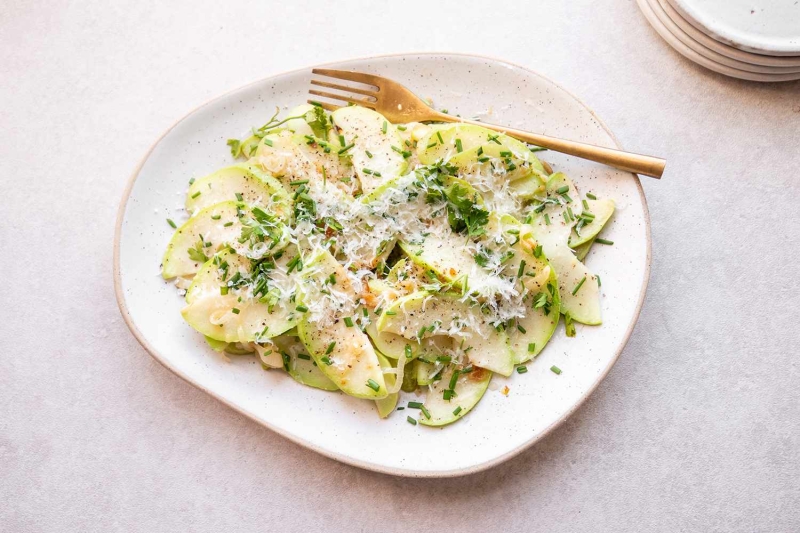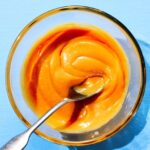Prep: 15 mins
Cook: 12 mins
Total: 27 mins
Servings: 6 to 8 servings
In this easy side dish recipe, a combination of butter, shallots, and garlic takes advantage of chayote squash’s incredible ability to absorb flavors. Serve it as-is or finish the dish with a garnish of fresh herbs, Parmesan cheese, or crisp, crumbled bacon. This sautéed chayote makes a fabulous side dish that goes well with fish, seafood, meat, and poultry. It’s also great as part of a vegetarian meal.
What Is Chayote?
Also called vegetable pear, pear squash, choko, or mirliton—among other names—pear-shaped green chayote squash is a type of summer squash that is native to central Mexico and appears in Mexican cuisine and many other Latin American cuisines.
It has also been cultivated and used in the Cajun and Creole cuisines of Louisiana since the mid-1800s. While chayote doesn’t enjoy the popularity in the rest of America that zucchini, pumpkins, and other better-known gourd fruits do, it is worth seeking out for its mild flavor and versatility.
How to Shop for Chayote
Chayote can usually be found in markets selling Latin foods, but if you can't find chayote squash in your local grocer and you live in an area with a long, hot growing season, you might be able to grow it in your garden.
Look for a chayote squash that is even in color, firm, free of blemishes, and on the smaller side. The squashes are sold ripe but will keep for a few days on a cool kitchen counter or in the refrigerator crisper drawer.
How to Prepare Chayote
Chayote is sometimes compared to a cucumber or zucchini, and it can be eaten raw or cooked, peeled or unpeeled. Its crisp texture makes it an excellent choice for sautés and salads, and its firmness means it’s ideal for spiralizing—try it in place of yellow squash in this spiralized summer squash recipe. It’s also delicious fried, stuffed, and smothered.
Whether you are eating chayote raw or cooking it, prep it by washing it, halving it lengthwise, and scooping out the large pit at the center of the squash.
Do You Eat the Skin of Chayote?
Whether or not to peel chayote before cooking it is entirely up to you. Some people prefer to peel it but its skin is tender enough to eat and quite tasty.
«I have never eaten or cooked with chayote squash but have seen them in stores and never knew anything about them or what to do with them. So, I was excited to try this recipe. The prep was easy and the finished dish was delicious.» —Carrie Parente
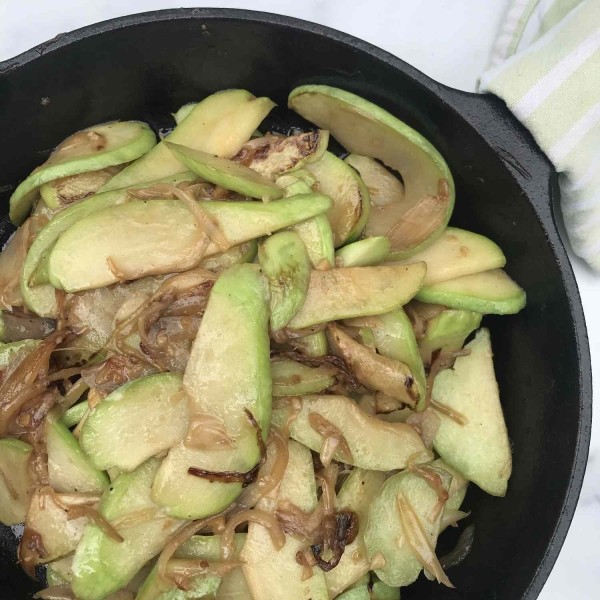
A Note From Our Recipe Tester
Ingredients
-
4 chayote squash (about 2 to 2 1/2 pounds)
-
3 tablespoons butter
-
4 shallots, thinly sliced (about 3/4 cup)
-
4 cloves garlic, minced (about 1 heaping tablespoon)
-
Kosher salt, to taste
-
Freshly ground black pepper, to taste
-
Chopped chives, parsley, and/or grated Parmesan cheese, garnish
Steps to Make It
-
Gather the ingredients.
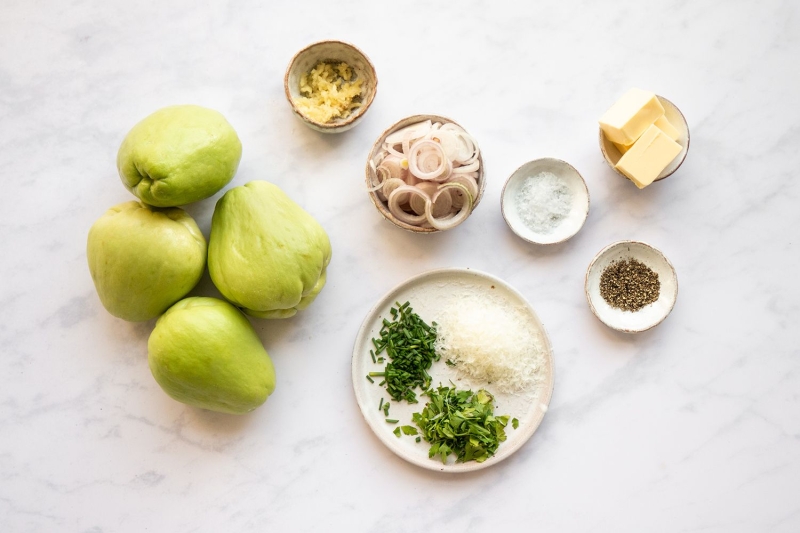
-
Slice the chayote in half lengthwise and scoop out the pit from each squash. Place the squash on a cutting board, cut-side down, and slice it thinly. Repeat with the remaining chayote squash.
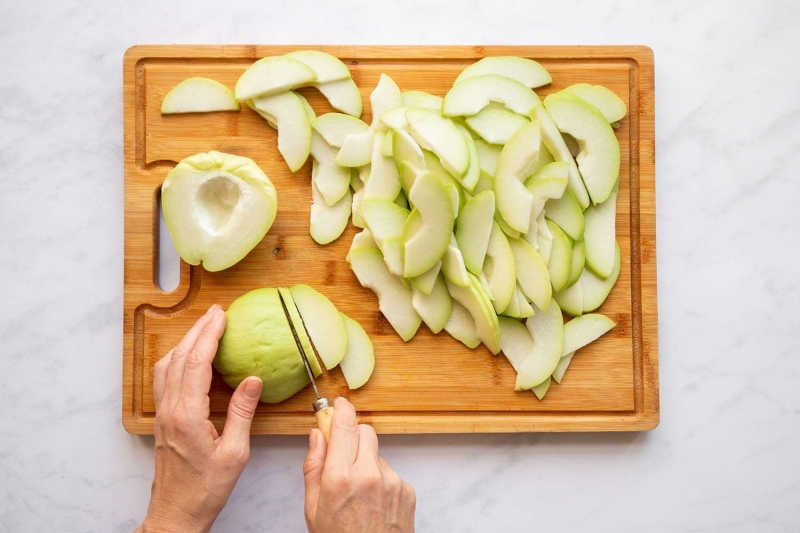
-
Melt the butter in a large sauté pan or skillet over medium heat. Add the sliced shallots and cook until they are tender and beginning to brown, about 5 minutes. Add the garlic and continue to cook for 1 minute longer.
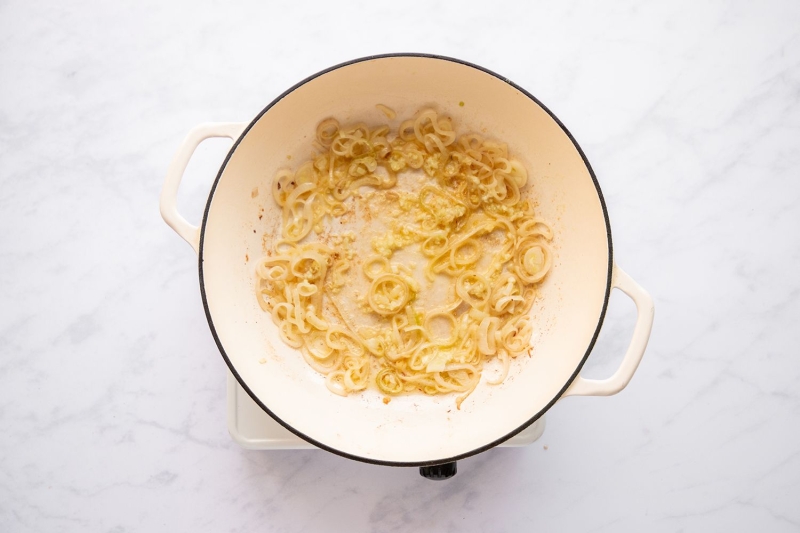
-
Add the sliced chayote squash to the skillet and continue to cook, tossing often until crisp-tender, about 3 to 5 minutes. Season with salt and pepper.
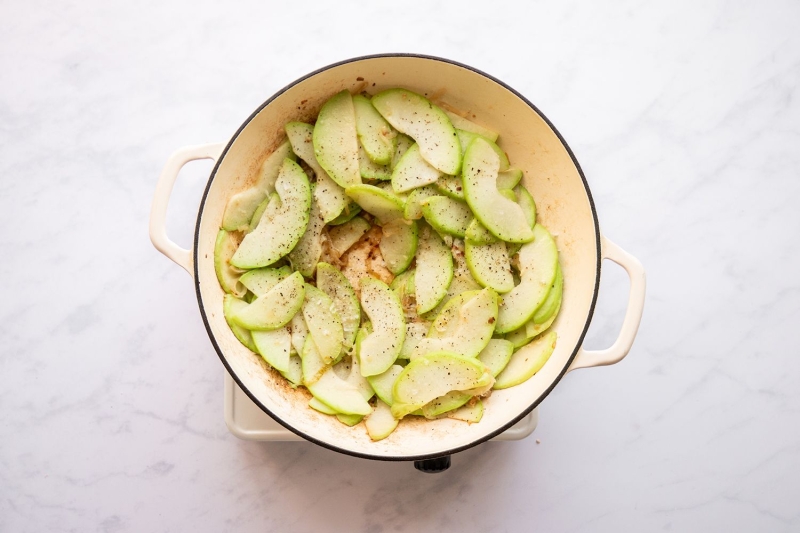
-
Serve the chayote squash with a garnish of fresh herbs and/or Parmesan cheese, if desired.
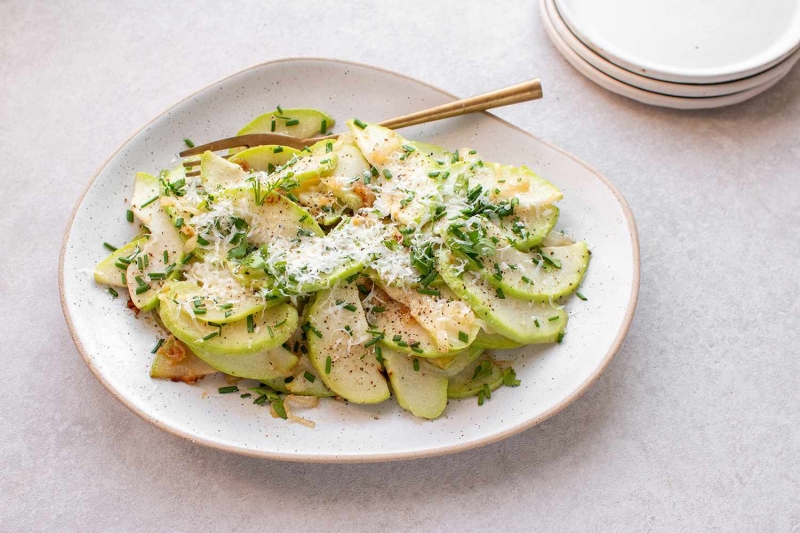
Recipe Variations
- Chayote with ham: Add smoky flavor to the sautéed chayote with some finely diced ham or tasso.
- Chayote with peppers: For additional color and flavor, sauté about 1/4 to 1/2 cup of red bell pepper along with the squash.
| Nutrition Facts | |
|---|---|
| Servings: 6 to 8 | |
| Amount per serving | |
| Calories | 86 |
| % Daily Value* | |
| Total Fat 5g | 6% |
| Saturated Fat 3g | 14% |
| Cholesterol 11mg | 4% |
| Sodium 77mg | 3% |
| Total Carbohydrate 10g | 4% |
| Dietary Fiber 5g | 16% |
| Total Sugars 4g | |
| Protein 1g | |
| Vitamin C 13mg | 65% |
| Calcium 29mg | 2% |
| Iron 1mg | 3% |
| Potassium 307mg | 7% |
| *The % Daily Value (DV) tells you how much a nutrient in a food serving contributes to a daily diet. 2,000 calories a day is used for general nutrition advice. | |
